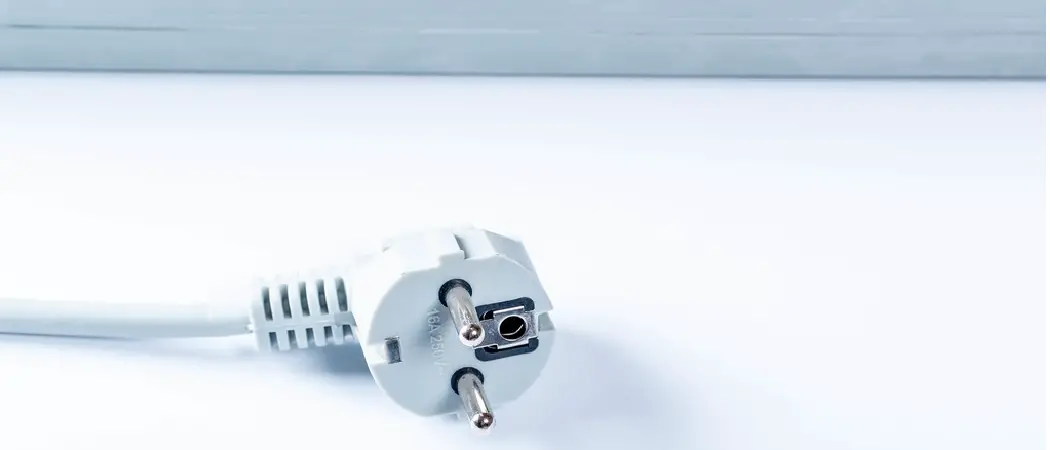When it comes to powering outdoor equipment, selecting the appropriate extension cord is crucial for safety and performance. In this comprehensive guide, we tackle the common query: Can any extension cord be used outside? With a meticulous blend of expert insights and practical advice, we unravel the complexities of outdoor electrical setups, empowering you to make informed decisions.
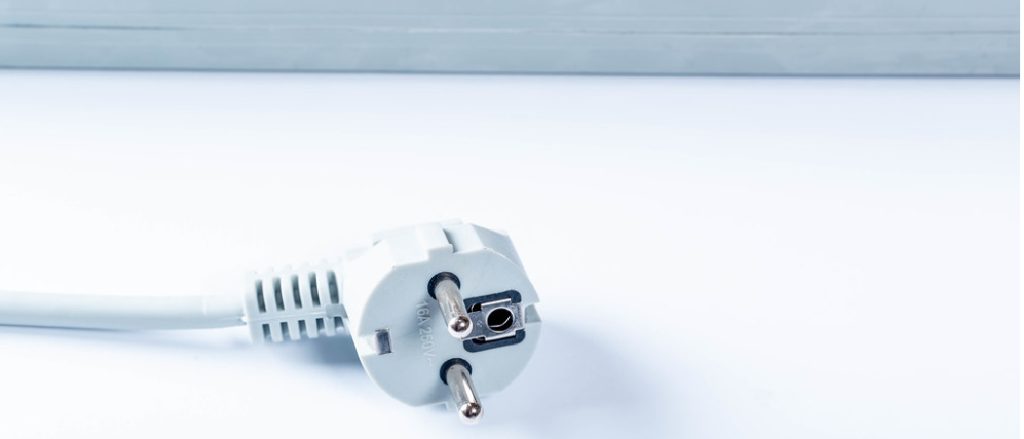
From understanding weatherproofing to selecting the right gauge, we cover it all, ensuring your outdoor power needs are met without compromising safety. Whether you’re a seasoned DIYer or a novice, join us as we delve into the nuances of outdoor extension cord usage, safeguarding your electrical connections with confidence.
Outdoor vs. Indoor Extension Cords: Key Differences
Insulation
Besides length and outlet shape, the key difference between indoor and outdoor extension cords is their insulation. Outdoor cords are designed with thicker, weatherproof insulation to protect against UV rays and moisture. This ensures they can withstand the elements without becoming damaged or creating a potential electrical hazard. Examples of outdoor cords include SJEOW, SOOW, and SJTW. On the other hand, indoor cords typically have thin insulation and are not suitable for outdoor use. Using an indoor cord outside could result in damage to the cord and pose a safety hazard.
Construction
Outdoor extension cords are constructed with durability and flexibility in mind. They are specifically designed to withstand physical stress, such as being stepped on or run over by vehicles, and can also handle extreme temperatures. This is because outdoor tasks often involve more rugged terrain and harsher weather conditions. On the other hand, indoor extension cords are not built for these types of stresses and may become damaged if used outside.
Grounding
Another key difference between indoor and outdoor extension cords is the grounding feature. Outdoor cords typically come with three-prong plugs that provide proper grounding for electrical devices, protecting against shocks and surges. On the other hand, indoor cords often only have two-prong plugs and may not offer adequate grounding when used outdoors. This could potentially put you at risk of electric shock.
Amperage Rating
When it comes to outdoor electrical tasks, it’s important to choose an extension cord with the appropriate amperage rating. This refers to the maximum amount of electrical current that can safely flow through the cord. Outdoor cords typically have higher amperage ratings compared to indoor cords because they are designed to handle more powerful appliances and tools. Using an indoor cord for heavy-duty outdoor tasks can overload the cord, causing it to overheat and potentially start a fire.
Can Any Extension Cord Be Used Outside: Facts and Tips
Now that we’ve established the key differences between outdoor and indoor extension cords, here are some important facts and tips to keep in mind when using an extension cord for outdoor tasks:
Check the Label
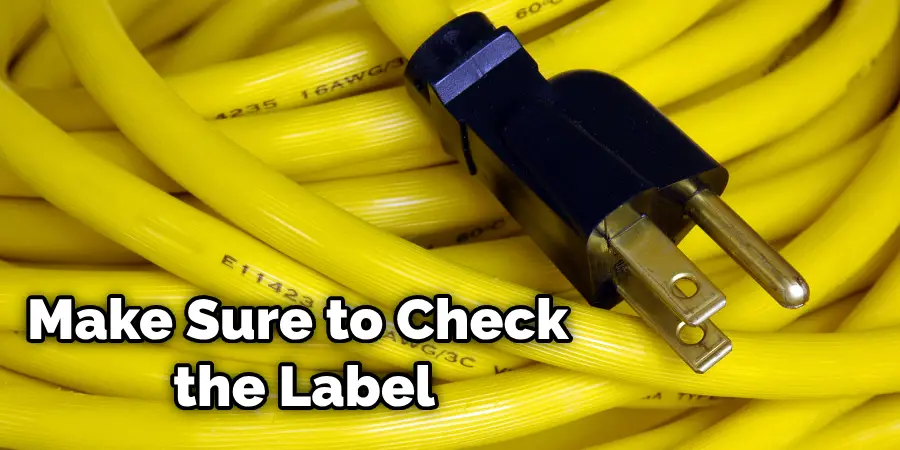
Before using an extension cord for outdoor tasks, make sure to check the label or packaging for the words “suitable for outdoor use.” This ensures that the cord has been designed and tested specifically for outdoor conditions.
Avoid Overloading
Never overload an extension cord, especially when used outdoors. Make sure to check the amperage rating of the cord and the electrical devices you will be using. If in doubt, it’s safer to use a higher-rated extension cord.
Keep Away from Water
Water and electricity do not mix well, so always keep outdoor extension cords away from wet or damp areas. Additionally, never use a damaged or frayed cord, as this could increase the risk of electrical shock.
Use Outlet Covers
When using an extension cord outdoors, it’s important to protect the outlets from exposure to rain or moisture. Outlet covers are inexpensive and can help prevent water from getting inside the outlets.
Keep It Off the Ground
Avoid laying an extension cord on wet or muddy ground, as this could damage the cord and create a potential safety hazard. Use cable ties or clips to secure the cord to fences, walls, or other structures.
Unplug After Use
After using an outdoor extension cord, unplug it from the outlet and store it in a dry, covered area. This will help prevent any damage caused by exposure to the elements.
Inspect Regularly
It’s important to inspect outdoor extension cords regularly for any signs of damage or wear and tear. If you notice frayed wires, exposed insulation, or other issues, stop using the cord immediately and replace it.
Use a GFCI Outlet
When using an extension cord for outdoor tasks, it’s recommended to plug it into a ground fault circuit interrupter (GFCI) outlet. This provides extra protection against electric shocks and can quickly shut off power in the event of an electrical fault.
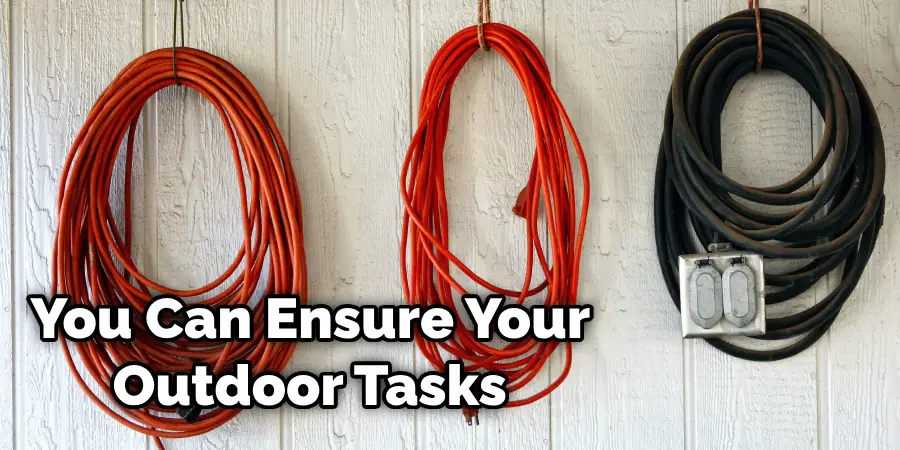
These facts and tips will help you to understand if any extension cord can be used outside. It’s essential to prioritize safety when using electrical tools and devices outdoors. By choosing the right extension cord for the job and following these guidelines, you can ensure your outdoor tasks are done efficiently and without any risks or hazards.
Recognizing Outdoor-Rated Extension Cords
UL Listing:
Look for the UL mark on the label or packaging. This indicates that the extension cord has been tested and meets safety standards set by Underwriters Laboratories (UL).
“W” Marking:
Some outdoor extension cords may have a “W” marking, which indicates that they are suitable for wet locations.
Color Coding:
Outdoor extension cords may also be color-coded for easy recognition. Yellow or orange cords typically indicate heavy-duty and outdoor use, while white or green cords are often intended for light indoor use only.
Gauge:
The gauge of an extension cord refers to the thickness of the wire inside. Outdoor extension cords usually have a thicker gauge compared to indoor cords, allowing them to handle higher amperage and power.
Length:
Outdoor extension cords come in various lengths, but it’s essential to choose one that is long enough for your needs without being too long. Longer cords can cause voltage drops and may not be as efficient at powering your devices.
Cordless Options:
If you’re concerned about safety hazards or constantly tripping over cords, consider using cordless tools and devices. This eliminates the need for extension cords altogether and can make outdoor tasks safer and more convenient.
Why Not Any Extension Cord Cannot Be Used Outside
Material:
Indoor extension cords are typically made of thinner and more flexible materials, which may not withstand the harsher outdoor elements. Outdoor cords are designed with sturdier and weather-resistant materials to ensure safety and durability.
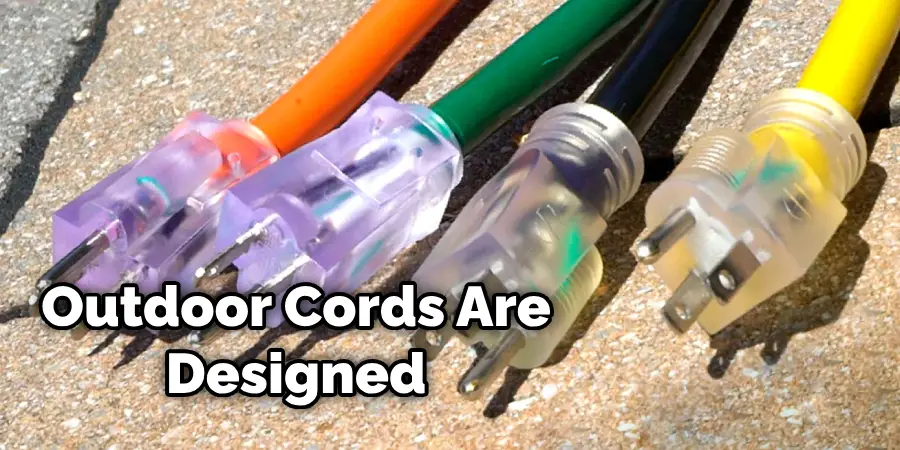
Temperature Range:
Outdoor extension cords are built to withstand a wider temperature range compared to indoor cords. They can handle extreme heat or cold without becoming damaged or brittle.
Water Resistance:
Outdoor extension cords often have a higher degree of water resistance compared to indoor cords. This is important for protecting against moisture and potential electrical hazards.
Durability:
Given the tougher conditions they are exposed to, outdoor extension cords are constructed to be more durable and able to withstand wear and tear. Indoor cords may not hold up as well when used outdoors.
Overall Safety:
Ultimately, the main reason any extension cord cannot be used outside is safety concerns. Using an indoor cord for outdoor tasks can potentially lead to fires, electrical shocks, and other hazards. It’s always best to use a cord specifically designed for outdoor use to ensure your own safety and that of those around you. So, it’s necessary to recognize and use outdoor-rated extension cords for any tasks that require electricity outdoors.
By understanding the differences between indoor and outdoor cords, checking labels and ratings, and prioritizing safety measures, you can ensure a successful and safe experience with your outdoor electrical devices. Keep these tips in mind every time you need to use an extension cord outside, even if it’s just for simple tasks like mowing the lawn or using a power tool. With the right extension cord, you can easily and safely accomplish all your outdoor tasks.
Safe Practices for Using Outdoor Extension Cords
Use the Correct Cord for the Job:
Be sure to select an extension cord that is suitable for your specific outdoor task. This means checking its length, gauge, and rating to ensure it can handle the power requirements of your devices.
Keep Cords Untangled:
Tangled cords can become damaged or even cause accidents. Be sure to untangle and lay out your extension cord before using it.
Protect Cords from Damage:
Avoid running extension cords across sharp edges or through doorways where they could get pinched or damaged. Also, keep them away from sources of heat and direct sunlight to prevent melting or other damage.
Use Cord Protectors:
For added protection and organization, use cord protectors to cover any exposed cords running across the ground. This can prevent tripping and keep the cords safe from outdoor elements.
Store Cords Properly:
When not in use, make sure to properly store your extension cord in a dry, covered area. This will help maintain its longevity and prevent any potential hazards.
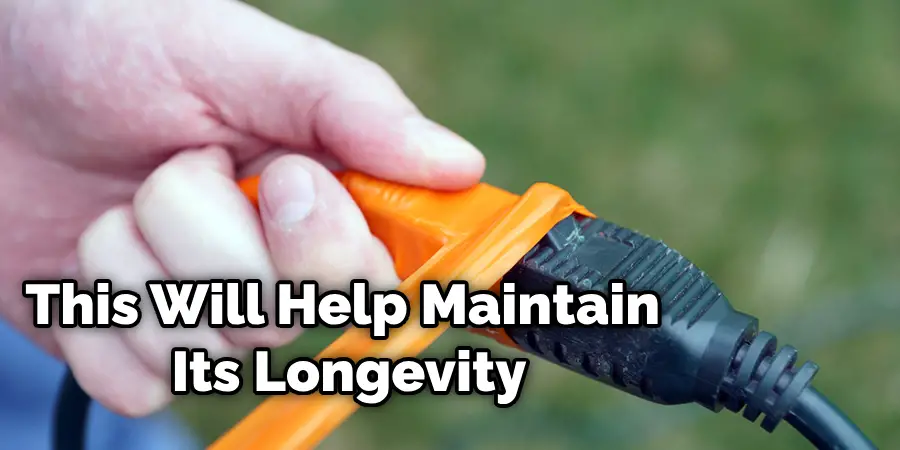
Never Modify Cords:
It’s never safe to modify or alter an extension cord in any way. This includes cutting or splicing it, using adapters, or removing the grounding pin. Always use the cord as intended, and if you need a longer cord, choose one with the appropriate length.
Regularly Inspect Cords:
Be sure to regularly inspect your outdoor extension cords for any signs of damage or wear. If you notice frayed wires, exposed insulation, or other issues, stop using the cord immediately and replace it with a new one.
Use GFCI Outlets:
Ground Fault Circuit Interrupter (GFCI) outlets are highly recommended when using extension cords outdoors. These outlets can help prevent electrical shocks by quickly shutting off power in case of an accident or malfunction.
Dangers of Using Indoor Cords Outdoors
Fire Hazards:
Indoor extension cords are not designed to withstand the outdoor elements, which can increase the risk of fires. Moisture, high temperatures, and exposure to sunlight can all cause damage to an indoor cord and potentially lead to a fire.
Electrical Shocks:
Using an indoor cord outside also increases the chances of electrical shocks. This is especially true if the cord is not rated for outdoor use or becomes damaged due to outdoor elements.
Damage to Devices:
Without proper insulation and protection, an indoor cord used outdoors may not provide enough power or can potentially damage your devices. This can be costly and even dangerous if the device in question is a power tool.
Compromised Safety Measures:
Indoor cords have lower safety ratings compared to outdoor cords and are not built to withstand the same conditions. Using an indoor cord outdoors can compromise safety measures and put yourself and others at risk of accidents or injuries.
Legal Consequences:
Using an indoor extension cord outside may also have legal consequences in some areas. It’s important to follow local regulations and use appropriate outdoor-rated cords to avoid any potential fines or penalties.
Frequently Asked Question
Q: What Is an Extension Cord?
A: An extension cord is a flexible electrical cable with a plug on one end and one or multiple sockets on the other end. It is used to extend the reach of electrical devices to power sources that are farther away.
Q: Can Any Extension Cord Be Used Outside?
A: While extension cords are convenient for outdoor use, not all of them are suitable for outdoor environments. Extension cords specifically designed for outdoor use are marked as such and are constructed with materials that can withstand exposure to moisture, sunlight, and other outdoor elements.
Q: What Are the Differences Between Indoor and Outdoor Extension Cords?
A: Indoor extension cords are typically made of lighter materials and are not designed to withstand the harsh conditions encountered outdoors. On the other hand, outdoor extension cords are constructed with weather-resistant materials such as vinyl or rubber and have features like water-resistant plugs and sockets.
Q: How Do I Choose the Right Outdoor Extension Cord?
A: When selecting an outdoor extension cord, it’s essential to consider factors such as the length of the cord, the wattage rating required for your devices, and the specific outdoor conditions it will be exposed to. Look for “suitable for outdoor use” or “weather-resistant” cords to ensure safety and durability.
Conclusion
In summary, understanding the distinction between indoor and outdoor extension cords is critical for safety and efficiency. Outdoor cords are specifically engineered to cope with the unpredictable conditions of the outdoors, from temperature fluctuations to water exposure. Ignoring these differences by using indoor cords outside can result in fire risks, electrical shocks, damage to appliances, and even legal consequences.
Therefore, always opt for the correct, outdoor-rated extension cord for any outside electricity needs. By doing so, we ensure not only our own safety but also the longevity and efficiency of our electrical devices. Remember to periodically check your cords for damage and use them according to the manufacturer’s instructions to maintain a safe and productive home environment. Thanks for reading this article,” can any extension cord be used outside?”
{ “@context”: “https://schema.org”, “@type”: “FAQPage”, “mainEntity”: [ { “@type”: “Question”, “name”: “What Is an Extension Cord?”, “acceptedAnswer”: { “@type”: “Answer”, “text”: “An extension cord is a flexible electrical cable with a plug on one end and one or multiple sockets on the other end. It is used to extend the reach of electrical devices to power sources that are farther away.” } }, { “@type”: “Question”, “name”: “Can Any Extension Cord Be Used Outside?”, “acceptedAnswer”: { “@type”: “Answer”, “text”: “While extension cords are convenient for outdoor use, not all of them are suitable for outdoor environments. Extension cords specifically designed for outdoor use are marked as such and are constructed with materials that can withstand exposure to moisture, sunlight, and other outdoor elements.” } }, { “@type”: “Question”, “name”: “What Are the Differences Between Indoor and Outdoor Extension Cords?”, “acceptedAnswer”: { “@type”: “Answer”, “text”: “Indoor extension cords are typically made of lighter materials and are not designed to withstand the harsh conditions encountered outdoors. Outdoor extension cords, on the other hand, are constructed with weather-resistant materials such as vinyl or rubber and have features like water-resistant plugs and sockets.” } }, { “@type”: “Question”, “name”: “How Do I Choose the Right Outdoor Extension Cord?”, “acceptedAnswer”: { “@type”: “Answer”, “text”: “When selecting an outdoor extension cord, it’s essential to consider factors such as the length of the cord, the wattage rating required for your devices, and the specific outdoor conditions it will be exposed to. Look for cords labeled as \”suitable for outdoor use\” or \”weather-resistant\” to ensure safety and durability.” } } ] }
